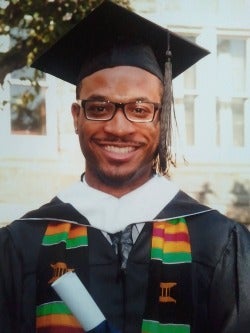Cultural Health from Maryland to Malaysia

Derek Dangerfield (C’12)
August 13, 2012—Sociology major Derek Dangerfield (C’12) hails from Baltimore City, an urban center where HIV is reported to infect residents at a rate five times higher than the national average. Recently named a Fulbright scholar, Dangerfield plans to research how the virus impacts the lives of people who live over 9,000 miles away—in Malaysia.
Initially enrolled in the McDonough School of Business, Dangerfield switched to the College during his sophomore year, pursuing sociology for its ability to link human beings to the larger institutions that govern them. “I’ve always been interested in how individuals interact with one another, and with how structural forces—in addition to individual choices—shape the way we are in society,” Dangerfield explained.
His interest in sociology was fostered by participation in the DC Reads Program, which functions under the America Reads Initiative through Georgetown and several other universities in the city. Through the popular literacy program—which matches children and adolescents with college-aged tutors—Dangerfield mentored students in Southeast DC for three semesters and witnessed firsthand how racial, socioeconomic, and educational disparities touched them and their communities.
This led him to examine his own journey to the Hilltop in a brand-new light.
“Sociology is important to me when I think about my personal story as an African American from Baltimore City who now has an education from Georgetown University,” Dangerfield said. “I’ve always understood that the structures of family, school, and even religion shape outcomes in society. But I realize that I’ve benefited from having privileges that everyone doesn’t have.
“I grew up in a working-class, single-parent home with my little brother, but somehow my family has managed to change social classes over time, arguably through education,” he continued. “I think about these things when I think back on my interest in sociology.”
For the past three years, Dangerfield has balanced schoolwork at Georgetown with research at the Johns Hopkins University (JHU) School of Medicine in Baltimore combining his interests in culture and medical health. At Johns Hopkins he contributed to three clinical studies, exploring how behavioral risk factors influence the spread of sexually transmitted disease. In the end, he learned that many social factors affect how disease spreads, from the different levels of education in a population to the attitudes toward sex.
Intrigued by the studies, Dangerfield decided to pursue a career in public health, with a focus on community health education and behavioral science. In his senior year, he applied for and was granted a Fulbright Scholarship, which for the next year will fund his independent research about sexual health in Malaysia. He will be supported by a team of doctors with ties to the Perdana University Graduate School of Medicine (PUGSOM) as well as to an international branch of Johns Hopkins in Kuala Lumpur, the capital of Malaysia.
“I’ll be conducting a survey to potentially uncover what Malaysians understand about HIV, where their knowledge comes from, and whether or not their behaviors—both sexual and drug-related—coincide with their knowledge of HIV transmission,” Dangerfield said. “It’ll be similar to the work I’ve been doing in Baltimore. I plan to gather information at clinics and drug-rehab centers in Kuala Lumpur with the help of doctors from PUGSOM and JHU.”
According to Dangerfield, even though Malaysian citizens experience lower rates of HIV infection than Americans, the fact that the virus “is contained within certain groups of people” in Malaysia creates an intriguing social situation. Responses to his survey will not only vary based on the religion and race of respondents, he says, but will also show the connection between health, ethnicity, and socioeconomics that exists all over the world.
“I hope to illuminate how culture greatly shapes HIV transmission, from the different levels of access to information people have, to the choices [we make that are] influenced by our communities,” Dangerfield said. “This work has become increasingly important to me because I’ve come to realize that, while professionals call some individuals at risk, we all interact with each other in some way or another—and social differences create unequal levels of risk.”